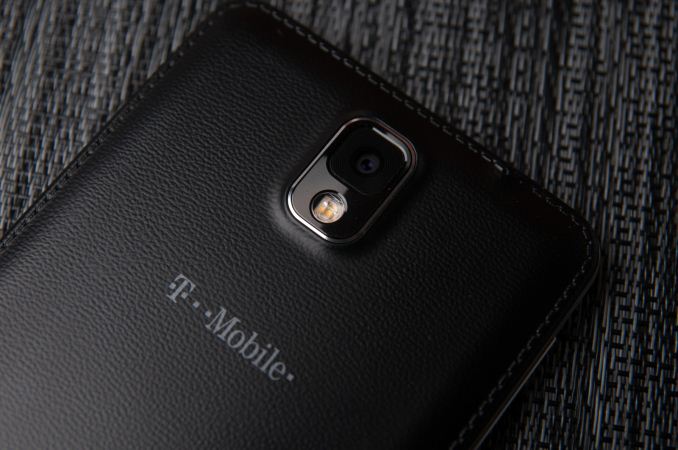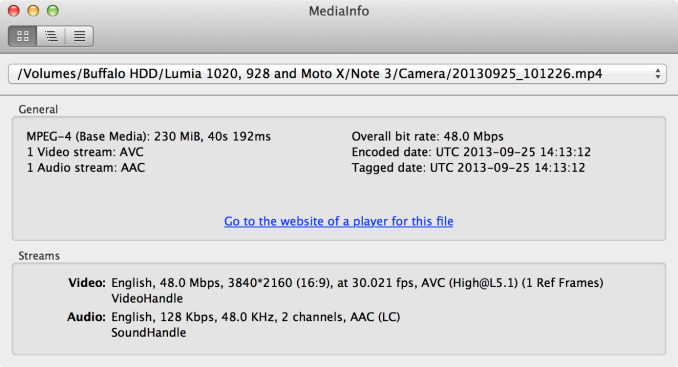Samsung Galaxy Note 3 Review
by Brian Klug on October 1, 2013 9:00 AM EST- Posted in
- Smartphones
- Samsung
- Mobile
- Android 4.3
- galaxy note 3
Camera
The cadence for camera on the Note platform has been pretty steady so far, it just inherits the camera module from the Galaxy S that came before it. In the case of the Note 3, that means the same module from Galaxy S 4, which is as far as I can tell what happened here. There’s an IMX135 sensor inside the Note 3, same as what shipped in GT-I9500, from Sony’s Exmor RS line. Specifically that means the Note 3 includes a 13 MP CMOS on the back with 1.12µm size pixels and a 1/3.06" optical format. Focal length changes slightly from 4.2 to 4.1 mm, but I’m not sure if this is just a rounding error, I suspect the same optical system is shared between the two, this works out to 31mm of focal length if you’re thinking 35mm equivalent numbers.
On the front is a 2 MP Samsung S5K6B2 CMOS with 1.34µm and 1/6" format. This is also shared with Galaxy S 4, which isn’t too surprising. So we have the same imaging on the back and the front as that flagship, with just different ISP in front of it with 8974.
Stills
For image quality we turn to the normal set of tests which I seem to always be adding to. Image quality bench locations taken at our usual set of locations, 3, 4, 5, 6, and 7 with the Note 3. In addition lights on and lights off in the lightbox, and the usual set of test targets.
Gallery: Smartphone Camera Bench
The Note 3 looks good outside and obviously reminds me exactly of the Galaxy S 4 when it comes to imaging performance. I never really had issues with SGS4 outside or in well lit scenarios, the Note 3 ends up being just about the same. I can’t say there’s really any surprises when it comes to still images out of the device, although the Note 3 absolutely struggles with white balance in the lightbox for some reason, which is odd considering Galaxy S 4 definitely didn’t have similar problems. Anyhow if you liked SGS4 imaging performance, Note 3 is definitely the same, it doesn’t really change the formula in low light however against the competition that now has OIS and bigger pixels, but I won’t belabor that point again.
Video
On the video side of the Note 3 we have an interesting new addition, 4k30 (or UHD) video record support, alongside both 1080p60 and 720p120. Higher framerate video has been an increasingly common thing lately, and the Note 3 supports this with the new video encode and decode capabilities of the 8974 SoC (Exynos 5420 doesn’t get any UHD video record features).
In the video recording UI you can select between the above video resolutions, at a framerate of 30 FPS. To get to 1080p60 you have to go under a different menu and select smooth motion, and 720p120 is under slow motion.
4k30 video gets recorded at 48 Mbps H.264 high profile with 1 reference frame, which will eat up space quickly but obviously blows things away with that much resolution, and 8974 doesn’t drop frames either. The 1080p60 video comes in at 28 Mbps H.264 high profile and also doesn’t seem to have any dropped frames. Audio in both cases is 128 kbps 48 kHz stereo AAC.
I uploaded two UHD samples to YouTube since it’s already 4K aware, if you select original quality from the switcher drop down. I don’t have a 4K display to view these on, but oversampled on the high resolution panels I do have it looks amazing. The 1080p60 content also looks great, although you’ll have to grab that one and view it on your own since YouTube (and really nowhere online I’m aware of) will show you 60p video at native framerate. I shot UHDp30 and 1080p30 videos in Times Square in NYC which you can grab, and UHDp30 and 1080p60 videos at the bench location which you can also grab if you want to look at that buttery smooth 60 FPS video.
I’m really impressed with video quality coming out of the Note 3, obviously having smartphones coming with UHD onboard is a big treat, and we now have smartphones beating other bigger standalone cameras to that punch.






















































302 Comments
View All Comments
identity - Tuesday, October 1, 2013 - link
Anandtech said every Android device does it but keep ignoring that ok?Chillin1248 - Tuesday, October 1, 2013 - link
And because several (he never said all) manufacturers are cheating, the rest have to suffer?At the very least he could be fair and run the battery tests with the browser renamed as one of the "boost" apps. Let's see how Samsung (and others) will like how their results show up then compared to the manufacturers that aren't doing such blatant cheating.
identity - Tuesday, October 1, 2013 - link
Samsung still beat the G2 without the boost according to Arstechnica anyways. I doubt people will care if the HTC One uses the same boost(which it does and nobody cares) because it's not a threat to Apple and it's not Samsung,Chillin1248 - Tuesday, October 1, 2013 - link
But barely, not with the huge margin that we currently see in Anand's benchmarks.Anand, for the sake of your site's integrity; I plead with you to take down the current benchmarks and re-run them with ARSTechnica's workaround. Either that, or run the WiFi battery benchmarks while renaming the browser to one of the "boost" applications. That way, it will be a fair comparison of the Device's User Experience.
Squuiid - Tuesday, October 1, 2013 - link
Does that make it ok then? Benchmarks are used to compare cross platform devices. Pretty sure Apple and Microsoft don't inflate their benchmarks.Would you condone drug taking in sports if everyone doped?
stajcer - Tuesday, October 1, 2013 - link
I too am disappointed in Anandtech's coverage of this issue. I think that this is usually one of the best written and most in depth hardware review sites out there, but to (seemingly) gloss over this issue with one or two lines in the review and then state that the Note 3 has the fastest s800 chipset is just absolutely false. You know that its cheating, and you mention it in the review, but then coming to the conclusion that this is the 'fastest android device' based on benchmark info that you know to be misleading is a huge error IMO.Just because other companies do it does not excuse this behaviour. unless more people are made aware that they're cheating (one or two lines buried in the middle of a review dont matter) they'll keep doing it. The only way to end it is to blatantly call out the manufacturers that are doing it. Which means that you cant conclude something is 'the fastest' if you know that the benchmarks are run in a way on the device that it cant be replicated by the end user - end of story.
Klug4Pres - Wednesday, October 2, 2013 - link
I too am disappointed in the way Anandtech is choosing to deal with benchmark cheating. Either find a way to circumvent the cheating, or do not post benchmark results. It really is that simple.doobydoo - Saturday, October 19, 2013 - link
I completely agree. If you know a phone is boosting a benchmark - the point on the graph should be labelled as 'artificially boosted' or words to that effect. Then a non-boosted benchmark should be run.2disbetter - Tuesday, October 1, 2013 - link
I don't know... I'm not that bothered by Samsung's attempt to get higher scores. Their "cheating" as it were, is simply overclocking the chipset. The chipset IS in fact performing as the benchmark indicates. It's misleading, sure, but not really lying. We have long since surpassed the need for hardware speed improvements on any mobile OS, so bickering about performance seems kind of redundant. None of the premier phones today can actually really use their horsepower so ultimately what does it really matter?xype - Wednesday, October 2, 2013 - link
It matters because it makes the damn benchmarks useless. What help are performance graphs if they have to come with an asterisk and "Well, not that any performance difference seen herr matters anyway, cause we're too fucking lazy to put in the work and do a proper comparison."